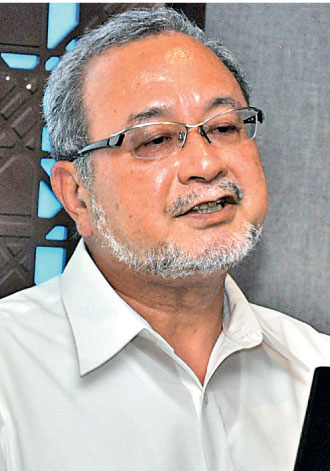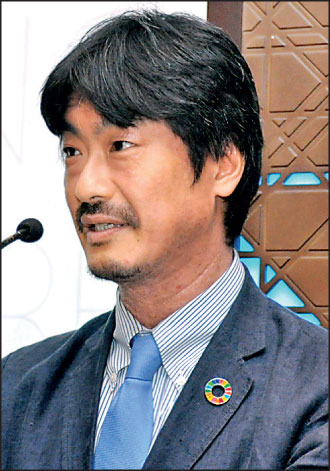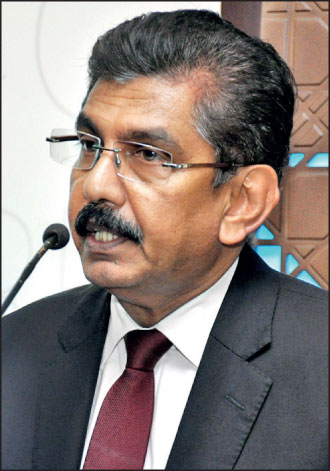Monday Feb 23, 2026
Monday Feb 23, 2026
Thursday, 31 August 2023 02:32 - - {{hitsCtrl.values.hits}}

Presentation by a representative of Pacific Consultants

Embassy of Japan Deputy Head of Mission Katsuki Kotaro delivering opening remarks

Ministry of Environment Secretary Dr. Anil Jasinghe addressing the gathering
By Randima Attygalle
At the awareness session held last Tuesday for local industry representatives on the Joint Crediting Mechanism (JCM) introduced by the Japanese, Ministry of Health Secretary Dr. Anil Jasinghe remarked that mechanism will not only benefit Sri Lankan industries in their low-carbon technology mandate, but it will also give muscle to realise the National Determined Contribution (NDCs) of reducing the emission of greenhouse gases by 14.5% by 2030.
The JCM study session was co-organised by the Embassy of Japan, with the Ministry of Environment and the Japan External Trade Organization (JETRO).
In an attempt to find a solution for the global issue of global warming, the United Nations Framework Convention on Climate Change (UNFCCC) and its Paris Agreement have been ratified by the parties. The Paris Temperature Goal is to avoid dangerous climate change by limiting global warming to well below 2°C and pursuing efforts to limit it to 1.5°C. Being a party to the UNFCCC and its Paris Agreement, Sri Lanka submitted its updated Nationally Determined Contributions (NDCs) to the UNFCCC in 2021.
To achieve NDCs targets to support the global effort of the Paris temperature goal, UNFCCC has introduced the mechanisms under Article 6 of the Paris Agreement. The Joint Crediting Mechanism (JCM) is the tool introduced by the Japanese in line with Article 6 of the Paris Agreement. With the objectives of achieving Sri Lanka’s NDCs and contributing to the country’s sustainable development, Sri Lanka signed the agreement with Japan to implement the JCM in October last year.
“Since the signing of the MOU last October, we have done all necessary work to lay the foundation for JCM here at home. It is a very good opportunity for Sri Lankan industries to implement JCM projects in the energy, transport, industry, waste, and agriculture sectors by applying new low-carbon technologies with the support of the Japanese counterpart,” remarked Dr. Jasinghe.
Currently, Japan has signed bilateral agreements with 27 countries around the world. Implementing projects under the JCM mechanism offers multiple benefits including new technologies and technical expertise, capacity building, generation of green jobs and new infrastructure development. The Japanese government and its private sector provide technical assistance and part of the capital investment to implement this mechanism in developing countries.
In terms of facilitating the JCM projects, Japan’s Ministry of Environment has announced the new proposals for JCM model projects for the years 2023-2024 through the Global Environment Center Foundation. Partner countries can submit the project proposal until the end of November this year through the JCM Secretariat in collaboration with the Japanese counterpart.
Minister and Deputy Head of Mission at the Embassy of Japan, Katsuki Kotaro in his opening remarks at the awareness session noted that JCM offers a platform for bilateral cooperation not only to address environmental challenges but also to nurture economic growth and technological innovation. He also remarked that the gathering signifies the shared commitment of Japan and Sri Lanka towards achieving sustainable development and climate-friendly practices. “I am confident that the knowledge imparted during this session will extend beyond these walls. It will disseminate through our respective industries and organisations, nurturing a deeper appreciation for the mutual benefits that JCM brings to Sri Lanka and Japan.”
The session also featured a comprehensive presentation delivered by Pacific Consultants elaborating on JCM’s potential benefits for both countries and its all-encompassing role in the broader context of environmental conservation and sustainable development. JETRO Colombo’s Resident Representative, Hiroki Oi concluded the event by introducing views of Japanese companies on environmental sector and expectations for investment in decarbonisation.
Pix by Lasantha Kumara